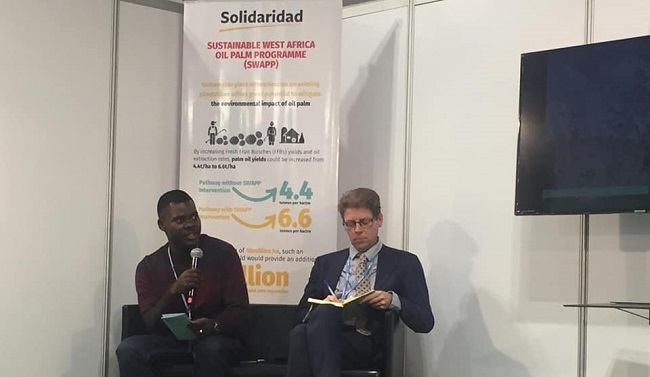The Women Environmental Programme (WEP), Solidaridad Network Organisation, Alex Ekwueme Federal University Ndufu-Alike (AE-FUNAI) and Climate and Sustainable Development Network (CSDevNet) at the ongoing 24th Session of the Conference of Parties (COP24) to the United Nations Framework Convention on Climate Change (UNFCCC) holding in Katowice, Poland, presented smart projects and practices that can contribute towards achieving the Nationally Determined Contributions (NDCs) commitments and the Paris Agreement in West Africa.

The smart projects and practices were presented at a side event the organisations collaboratively hosted at the Nigerian Pavilion at COP24 on December 6, 2018.
Welcoming participants to the event and declaring the event open, the Director, Department of Climate Change, Federal Ministry of Environment, Nigeria, Dr. Peter Tarfa, appreciated the collaboration of the organisations as he stated that this is needed to find a collective solution to climate change challenges.
Speaking on the collaboration, Atâyi Babs, National Network Coordinator of CSDevNet who moderated the event, described the COP24 side event as one of the quick wins recorded by the National Civil Society Framework on Paris Agreement and SDGs, recently launched by the network in Nigeria.
“The Framework which comprises a broad spectrum of Nigerian CSOs was established to enhance Nigerian Civil Society participation in post-Paris Agreement activities, amplify voices of vulnerable people and ensure that the recognised role of CSOs within the provisions of the Paris Agreement is at the centre-stage of the implementation in Nigeria and today’s event is a shining example in that regard,” Atâyi said.
The organisations took turns to present their smart projects and practices that they have implemented.
Mr John Baaki, WEP’s Programme Manager, presented the following projects and practices by the organisation:
- Trees planting project involving 2,000 trees across the FCT as well as Benue, Kano and Katsina states with support from Trees for Cities. This project, WEP said, would help to remove greenhouse gases from the atmosphere, prevent land degradation and provide a source of income for communities where the project has been implemented.
- Solar dryer tent: WEP also constructed a solar dryer tent for the farmers of Adogo, a community in Nigeria’s Mbaya district of Buruku Local Government, Benue State where sun drying was the only way to preserve produce as local women would lay fruits and vegetables on the ground to dehydrate them for future use. Sun-drying is unfortunately time-consuming and weather dependent and exposes food to contaminants like dust and insects. With the construction of solar dryer tent in the community, drying becomes faster, more hygienic and post-harvest losses would be reduced.
- WEP also presented initiatives that advocate for the implementation of the Gender Action Plan of the UNFCCC in Nigeria as well as the initiative that trains women to upcycle waste plastic bags into shoes and other products.
Solidaridad on the other hand presented her “National Initiatives for Sustainable Climate-Smart Oil Palm Smallholders – NI-SCOPS” project, sharing experiences from Asia and Africa. Jan Maarten Dros, Climate Innovation Manager at Solidaridad, led the discussion on behalf of Solidaridad Network on effective approaches for implementing the project NI-SCOPS in Asia and Africa.
Dr. Samson Samuel Ogallah, who is the Senior Climate Specialist at Solidaridad, added that the NISCOPS project with the support from the Dutch Government focused on four countries in Asia and Africa. The countries include Ghana, Nigeria, Malaysia and Indonesia. Dr. Ogallah added that the project will contribute the countries’ efforts at addressing the impacts of climate change, achieving their NDC commitment under the Paris Agreement and the Sustainable Development Goals.
The Regional Director for Solidaridad West Africa, Isaac Gyamfi, during one of the COP24 events, also highlighted some of the milestone achieved so far in the region. These include supporting smallholder producers to increase their productivity and improved livelihood, facilitating market opportunities for farmers, credit and input access for small and medium scale enterprise farmers and stimulating public-private partnerships while ensuring continual improvement for sustainable climate smart production systems.
AE-FUNAI also shared experiences of her initiatives of greening the university through tree planting.
According to the organisers, the aim of sharing the smart projects and practices is so that they can be replicated by communities to address their climate challenges.
